Automatic language translation
Our website uses an automatic service to translate our content into different languages. These translations should be used as a guide only. See our Accessibility page for further information.
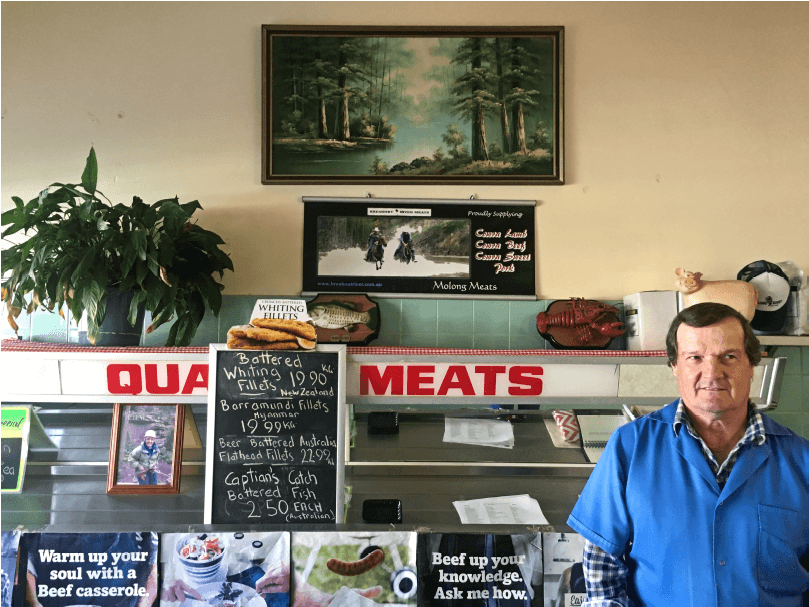
Tim has been Molong's only butcher for the past 20 years, having started as an apprentice at 17. He married his wife Vicki at a young age and together they had five children. They have eight grandkids.
Vicki used to work alongside Tim in the butcher shop – 'We were a good team,' says Tim – until their daughter was diagnosed with a brain tumour at 19. The only doctor who would operate was the renowned neurosurgeon, Charlie Teo. The operation was dangerous and expensive; it cost more than what the family could possibly raise. The town of Molong banded together, held a fundraiser, and collected enough for the operation, along with Tim and Vicki's life savings.
Unfortunately, the surgery left Ellie with severe disabilities. Vicki and Tim are now her full-time carers, with Vicki staying home to look after her. 'She knows who we are but she's very disabled,' says Tim. 'We were well and truly thrown in the deep end.'
Tim is set to retire from the butchery business soon. 'I'll miss the people but the body wears out.' The people of Molong will miss Tim the butcher dearly.
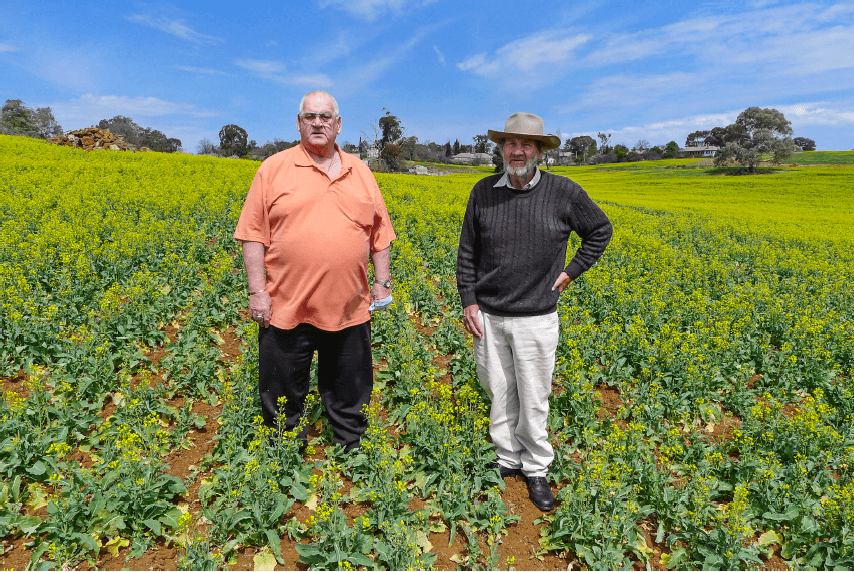
Jim and Stu have been great mates for over 60 years. They met in 1955 at Fairbridge Farm School, a home for child migrants outside of Molong.
Stu was taken from Manchester at the age of four. He stayed at Fairbridge for 13 years, making him the longest resident. Jim was just three when he was taken off the streets of Scarborough, along with his older brother. He spent 12 years at Fairbridge.
'We got told that we came down a sewage pipe and they caught us with a net. We were "guttersnipes", says Jim. 'We were also told that we were orphans. We weren't, but they intercepted our mail. We never heard from our parents.'
'Public thrashings were the norm. They would happen up on a stage. If you were caught smoking, you'd have to choose between the hockey stick, cane or a plumber's rod.'
'When my kids were born, it took me years to show them any affection because we never had any,' says Stu. 'If someone put their arm around you, you'd suspect they wanted to muck with you.'
'The main ethic on the farm was work,' says Jim. 'We got up at 5.45am to polish the floors. After you turned 14, you went to work in the dairy. Get up at 3am to milk the cows ... We had our own veggie garden, made our own bread. We learned skills, but no education.'
These days, if the men are feeling a bit down, they meet in Orange, have 12 cups of coffee, a plate of scallops, a few laughs, and then go home.
Jim and Stu were among the estimated 7,000 child migrants brought to Australia to live in institutions like Fairbridge. As well as losing their families and homelands, many child migrants experienced abuse and neglect. In 2009, the Australian Government made a national apology to the Forgotten Australians and former child migrants.
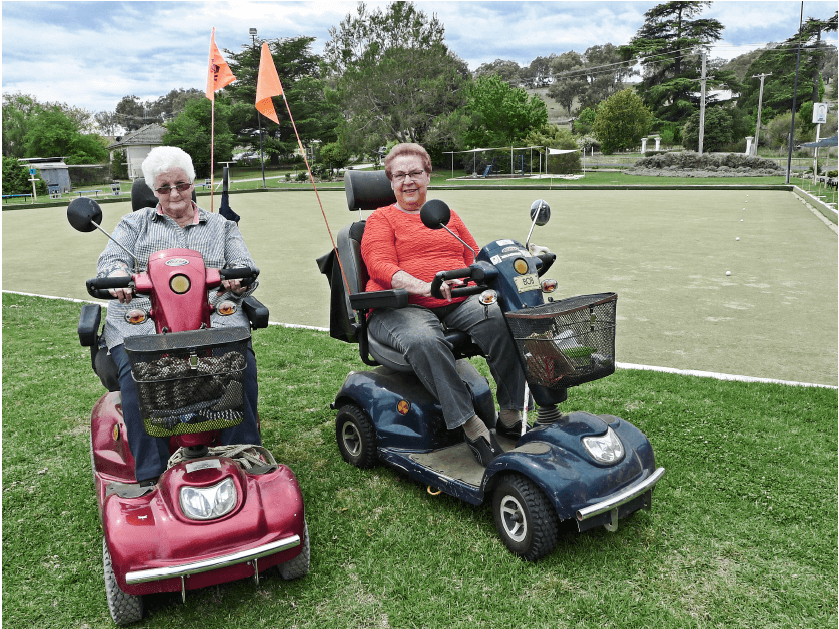
Ann and Margaret have been best friends for over 40 years. Often seen having a yarn or heading down Molong's main street on their gophers, they are local identities. Between the two of them they have eight children, 22 grandchildren and 15 great grandchildren.
Ann grew up in Molong, working as a nurse for 30 years doing night duty at Molong Hospital. 'I loved night duty. It meant I could have a family life with the kids during the day and they didn't miss me while I was at work.' She was named Volunteer of the Month in 2010 and Citizen of the Year in 1999 for her commitment to the town, including being Chair of Molong Bowling Club, Secretary of the Children's Safety House, and single-handedly doing the personal washing for patients of the hospital.
Margaret ran her own mail contracting business for 30 years and was the Secretary at the bowling club for 40 – but she may be best known for her legendary scones. Ann taught Margaret how to drive when Margaret was 40, something she used to do her mail run. For fun, Margaret says the two friends 'just drive around on our gophers. We go out for lunch. We get our hair done on Fridays ... that's always nice.'
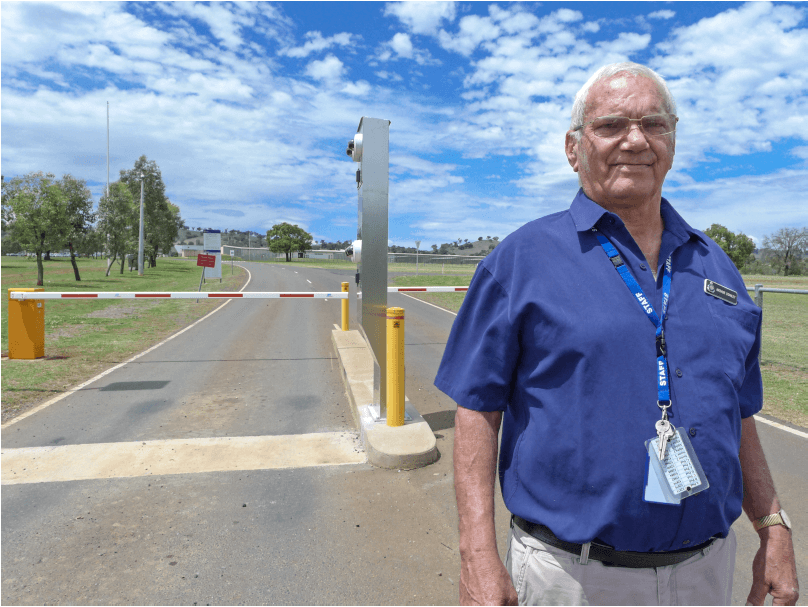
Arthur was raised on a mission called Nanima, or Blacks Camp – the earliest remembered Aboriginal camp in the Wellington area. Wiradjuri people lived segregated from the town's people. 'The Mission was a good place to be,' he says. 'Nobody bothered us. We did what we wanted to do.'
Arthur and his wife of 48 years, Eileen, have three kids, 13 grandkids and two great grandkids. 'My wife is white, in case I get barred from the pub,' he says with a cheeky smile. 'Her father didn't want us to marry but it was a case of "with or without you mate", and that was that.'
At the age of 10, Arthur was diagnosed with a leaking valve in his heart and told he would never be able to do physical labour. Hailing from a family of shearers, he refused to be cast off and went to work in the sheds as a rouseabout. After undergoing a knee replacement, Arthur was forced to give up the shearer's life and applied for the position of Aboriginal mentor at Wellington Correctional Centre.
Arthur's job as a mentor is to listen to the needs of Aboriginal inmates and negotiate these with the authorities. 'It's about trying to be there for inmates on a needs basis, connecting them to their family,' he explains. 'If a loved one is sick or in hospital, I'll try and get him to the hospital for a visit. I'm mostly successful. It's very fulfilling – especially when I've done something to help someone.'
'I'll retire when they cut my legs off, or something.'
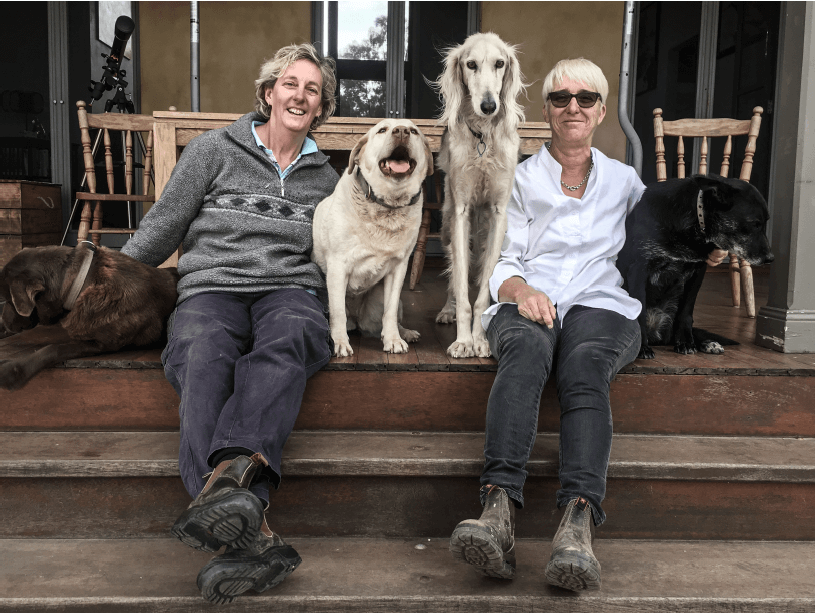
Helen and Michelle own Twisted River Wines in Manildra. It's a small winery that's winning big awards. It's also the only one in the region run by two women.
Helen and Michelle both have backgrounds in palliative care. As well being Twisted River's self-taught vigneron, Helen works as a nurse at Molong Community Health. Michelle, who looks after sales and marketing for the winery, works as a senior planner for NSW Health. She's about to retire – something that Helen is very jealous of.
The couple met at a palliative care conference in 1999. Helen soon moved from Sydney to the Central West. Since she was young, her dream had been to own a winery. With enough pestering, Michelle came around and in 2007 they bought Twisted River.
The first year was almost their last. Michelle recalls their first storm, 'I was working at home and was looking at all the rain on the terrace. I went to get the camera from the garage,' she says. 'This sea of water came at me and straight through the garage.'
When Helen reached home, the destruction was devastating. 'Fifty rows of pure chaos. We thought, "what have we done?" We almost gave up. Then in 2011, we won our first trophy and it all felt as if maybe it was worth it.'
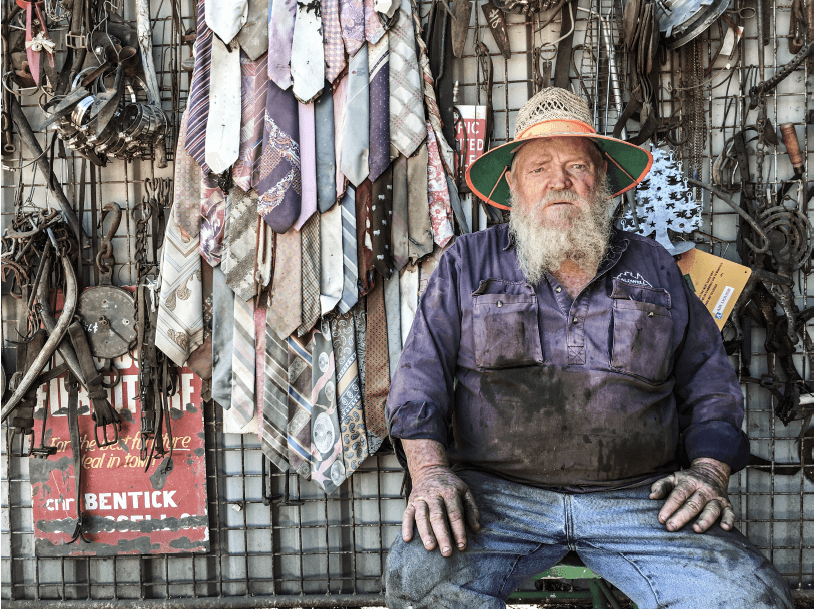
Benny was born in Molong hospital and besides a brief stint away has lived there ever since. He lives with his partner of 47 years, Judy, who he started dating at 17. They have two grown boys.
Benny owns a metal recycling business known as Benny's Junkyard. It's something of a local icon. Visitors to Molong are always encouraged to visit his shop with its dark interior maze of vintage treasures and sprawling yards of scrap metal. He enjoys working for himself. 'Nobody tells me what to do,' he says. 'I enjoy it. Ever since my father passed, I've worked for myself. Before that, I worked for him.'
Benny says he's still denying retirement at this stage. 'I'm of the opinion that if you don't use it, you lose it,' he says. 'I can't see myself watching TV all day. Who knows what I'll do then. I've got no super ... but I'm not even looking towards that.'
He says that although he goes to the city to 'sample', he prefers Molong. 'I think it's the best. The climate is great, the people are friendly, it's not a rat race.'
Kerri is a designer and photographer living and working in rural NSW. Two years ago, she picked up her two children (aged six and eight) and moved from Sydney to a rambling historical homestead near Molong in central west NSW. Kerri completed a degree in photography from Sydney College of the Arts – about a million years ago. Since then she’s worked as a designer of websites, print and fashion, and a photographer of people. These days, she works three shifts a week at the local pub to get from behind her desk and in front of people. Small towns have big stories, and working behind the bar allows unique access to these stories. Kerri is currently compiling work for a book and show about the people of Molong.
14 Oct 2022